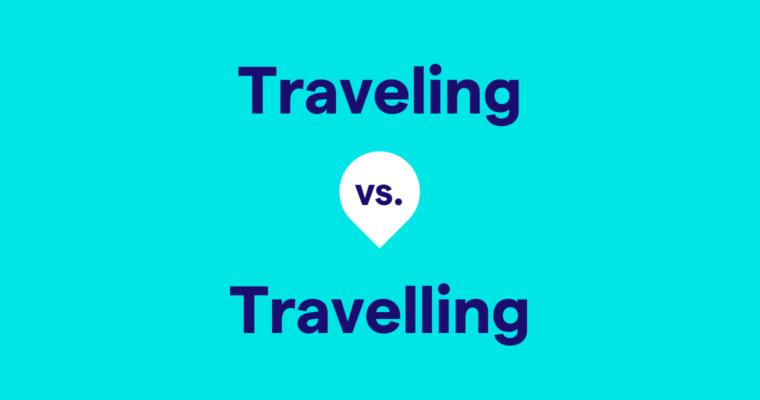
Key takeaways:
- The spelling of traveling versus travelling depends on whether you’re writing for an English-speaking audience inside or outside the United States.
- In American English, traveling with one L is preferred, while travelling with two Ls is the standard in countries that use British English, such as the United Kingdom, Canada, Australia, and more.
Travel is a wonderful experience—whether it involves meeting new people, exploring new places, or immersing yourself in different cultures. But there’s one small issue that can make traveling tricky: the spelling.
While travel itself is easy enough to spell, terms like traveling, traveler, and traveled often cause confusion due to differing regional spellings. In this post, we’ll clarify when to use traveling versus travelling and how these spelling preferences depend on your audience’s location.
Table of contents
Traveling or travelling: What’s the difference?
Spelling rule: When to double the “L”
Traveling or travelling: What’s the difference?
Technically, traveling and travelling are the same word, and you can use either spelling—but keep your audience in mind. The variation comes from the split between British and American English, each of which encompasses a wide array of dialects and variations.
American English: traveling
Traveling (with a single L) is the preferred spelling in the United States. This follows the general American tendency to simplify words by dropping extra letters, similar to:
- Color vs. colour
- Honor vs. honour
- Favor vs. favour
British English: travelling
Travelling (with two Ls) is the standard spelling in the United Kingdom, Canada, Australia, and other current and former Commonwealth territories that follow British English conventions. This aligns with British spelling rules for words ending in a vowel plus L, where the final L is doubled when adding a suffix like -ing or -ed, such as:
- Cancel → Cancelling and Cancelled
- Label → Labelling and Labelled
- Model → Modelling and Modelled
Spelling rule: When to double the “L”
In American English, whether you double the final consonant before adding a suffix depends on where the stress falls in a two-syllable word. A “stressed” syllable is the one emphasized more in pronunciation.
If the stress is on the final syllable, double the consonant.
Example: repel → repelling
American English doubles the L in repelling since you stress the final syllable in repel. Do not double the consonant if the stress is on the first syllable.
Example: travel → traveling
Since travel stresses the first syllable, American English keeps a single L in traveling.
To better understand when to double the consonant, below are more examples comparing words with stress on the final syllable versus the first syllable:
Final vs. first syllable stress
| Stress on the final syllable (Double the consonant) | Stress on the first syllable (No doubling) |
| admit → admitting | travel → traveling |
| begin → beginning | happen → happening |
| regret → regretting | open → opening |
Which spelling should you use?
When deciding which spelling to use, consider your audience and the context:
Follow your audience’s preference:
- If you are writing for an American audience, use traveling.
- If you are writing for British, Canadian, Australian, or other current and former Commonwealth readers, use travelling.
Writing for a multiregional audience:
- If your content targets readers from multiple regions, choose one spelling and use it consistently.
- When in doubt, follow your organization’s style guide or rephrase to avoid the word altogether.
Ultimately, adjust your spelling of traveling or travelling to match your regional audience. Consistent spelling improves readability and demonstrates professionalism.
Adapt your writing for global audiences
Recognizing and adapting to regional spelling preferences shows respect for your audience and enhances clarity when communicating with them. Tailoring your content to align with American or British English conventions ensures your message resonates and is understood.
Check your spelling with Grammarly
Grammarly helps you navigate these linguistic nuances, guiding you to use the correct spelling for your intended audience. It can be customized to provide suggestions for major English dialects, including American, Canadian, Australian, and Indian. Try Grammarly today!
Traveling or travelling FAQs
Understanding the correct spelling of words like traveling can be tricky, especially when different regions have varying conventions. Below are frequently asked questions about traveling versus travelling and the double L rule.
Is it travelling or traveling in the US?
In the US, traveling with one L is the standard form. This spelling follows a common rule in American English: Words ending in a vowel followed by a consonant do not typically double the consonant when adding suffixes unless the final syllable is stressed.
Why is traveling spelled with one L in American English and travelling with two Ls in British English?
The spelling difference between traveling and travelling is a result of how English developed in different countries. In the US, a language expert named Noah Webster wanted to simplify English spelling.
He suggested using fewer letters when possible, which is why Americans write traveling with one L. In the UK, English speakers kept the older spelling with two Ls. Both spellings are correct, depending on whether you use American or British English.
What is the double L rule?
The double L rule is applied to English words when adding suffixes and depends on the region:
- American English: Generally doesn’t double the final L when adding suffixes to words like “travel” (traveling). Stress placement is a factor in consonant doubling in other circumstances.
- British English: Typically doubles the final L when adding vowel suffixes (like -ing, -ed, -er) to words ending in a vowel followed by L (travelling).
British English typically doubles the consonant, while American English doesn’t when the stress is on the first syllable.






